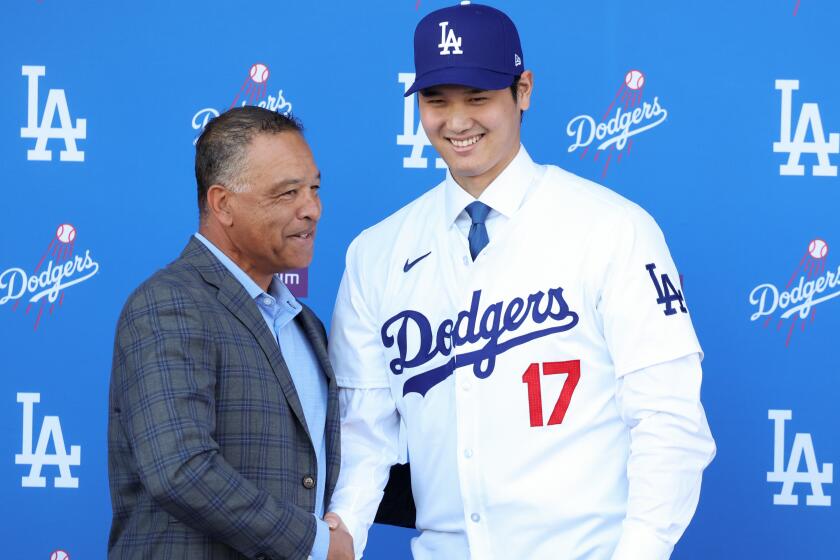Gott now provides relief in a different type of way
Knowledgeable, personable and well spoken, with a baseball insider’s perspective to boot, former Dodgers pitcher Jim Gott probably could have remained a sports talk radio host for as long as he wanted.
But Gott preferred a more noble calling: devoted dad.
Two of Gott’s six children are autistic, and Gott believed they needed his attention far more than any “first-time caller, longtime listener” did.
So Gott, a 6-foot-4 right-hander who spent five of his 14 major league seasons with the Dodgers and later put in two more years working for the Dodgers’ flagship radio station, pulled the plug on a nascent career in broadcasting.
Gott, 48, opted instead for more time with his family and a life geared toward helping other families facing similar challenges in coping with autism, a perplexing neurological disorder that affects one in 150 children.
“I feel just as passionately about being a great father and advocate for our special-needs kids as I did about being a great baseball player,” says Gott, who compiled a 56-74 record, 91 saves and a 3.87 earned-run average before elbow and shoulder injuries forced him to retire in 1995.
“Autism is at almost an epidemic proportion. This is something that needs a lot of attention and the Gotts, in our small way, want to contribute in any way that we can.”
Gott teaches classes in basic social skills at Education Spectrum, a 10-year-old Altadena training and diagnostic center owned and co-founded by his second wife, Cathy, and serving children with autism-spectrum disorders.
This Saturday, the Gotts will expand their reach when they are hosts to the grand opening of Danny’s Farm, an Altadena petting zoo and events facility named in honor of their animal-loving 14-year-old son. Geared toward special-needs kids and staffed by adults with special needs, the venture was funded by the Gotts with financial assistance from the Department of Developmental Services.
“This is something we’ve created for Danny to do when he’s older,” says Gott, whose 19-year-old son, C.J., also is autistic, though not as highly functioning as his younger brother. “Probably the scariest thing that’s happening right now is that we realize that our kids are going to be out of the house someday, so we’ve proactively started thinking about what Danny is going to do when he’s older.”
Of course, the Gotts’ work stands to benefit others too.
“They’re champions for people with disabilities, especially for individuals with autism,” says Carol Tomblin, director of community services at the San Gabriel/Pomona Regional Center, a nonprofit mandated by the state to offer lifelong support to people with developmental disabilities. “Through their efforts they are providing opportunities for people with disabilities as well as the community at large to have a better understanding of people with autism.”
It’s not always easy to understand, even for parents.
“You’re so overwhelmed,” Gott says. “Autistic kids look like typical kids. Physically, they’re developing normally. So when our kids are struggling and you’re taking them to the market and they’re having these ridiculous tantrums and people are looking at you like you’re a bad parent, it’s a very hard thing.”
The stress on the parents sometimes causes families to splinter, Gott says, and played a part in the breakup of his first marriage.
Recalling an eye-opening experience when C.J. was a toddler, Gott says his son went missing during a family day promotion at Dodger Stadium.
“All the other kids were out there with their perfect swings, throwing the ball around and following directions,” he says. “But when it was time for our family to go up for our at-bat, C.J. was gone. We looked everywhere, called security.”
They found him in the clubhouse, munching on cake.
“That was the first thing he saw when we got to the ballpark,” Gott says of the frosted dessert, “and he never let that go. For me, that was a big thing in terms of understanding that my son was different from all the other kids. I kind of had to go through a grieving process, grieving that my son wasn’t going to be the next star baseball player. And then I just learned to accept him for who he was.”
Later, when it became clear that the sights, sounds and smells of a ballgame overwhelmed his son, Gott made another adjustment.
“I learned to bring him to the ballpark way before the game started,” he says, “and he was able to enjoy the ballpark in a different way than a typical child.”
By then, Gott was used to making changes on the fly.
Mostly a starter through his first four major league seasons, he moved to the bullpen for his last 10, he says, because he was better suited to being a reliever: “I’m a very hyperactive guy and it’s important for me to stay on task and stay busy.”
Used mainly as a setup man, Gott nevertheless garnered 34 saves for the Pittsburgh Pirates in 1988 and 25 for the Dodgers in 1993.
“Not a Hall of Fame career,” he says, “but I had a really nice career and baseball afforded me an opportunity to take a few years after I was finished playing to kind of find this niche of working with special-needs children.”
It’s a niche he relishes.
--
More to Read
Are you a true-blue fan?
Get our Dodgers Dugout newsletter for insights, news and much more.
You may occasionally receive promotional content from the Los Angeles Times.






